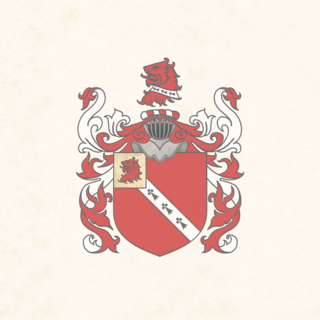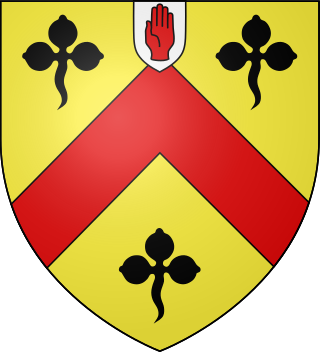Sir Robert Eden, 1st Baronet (c. 1644 - March 30, 1720) was the 1st Baronet of West Auckland. He was born and died in West Auckland, Durham, England.
Contents
His Baronetcy went to his son, Sir John Eden.
Sir Robert Eden, 1st Baronet (c. 1644 - March 30, 1720) was the 1st Baronet of West Auckland. He was born and died in West Auckland, Durham, England.
His Baronetcy went to his son, Sir John Eden.
Sir Robert Eden was born around 1644 to Col. John Eden and Catherine Eden (née Layton) in West Auckland, Durham, England.
Eden was a Member of Parliament for County Durham later.
Robert Eden officially became Baronet on the 13th November 1672.
On the 2nd of December 1672, Eden married Margaret Lambton, the heir of John Lambton.
Eden died in West Auckland on the 30th of March, 1720. His Baronetcy was left to his son, John Eden.
Eden was the Great-Grandson maternally of Thomas Fairfax, 1st Viscount Fairfax.
He descends from Robert Eden, whose brother married the Shafto family, which includes Sheriff of Newcastle upon Tyne, High Sheriff of Durham, and Mayors of Newcastle, on his Father's side. This makes the Shafto family all of his Cousins. Eden's son Sir John Eden married Catherine Shafto.
Robert Eden is also a descendant of Royal Blood of Scotland (William the Lion), as most people typically are, and can trace his roots back to Charlemagne.

Sir Robert Eden, 1st Baronet was a British colonial administrator who was the last colonial Governor of Maryland. Although a popular governor and an able administrator, Eden's authority was overthrown by the events of the American Revolution, and in June 1776 he was invited by the Maryland Convention to leave for England. Eden was well-regarded at home and in the same year, 1776, he was made a baronet. He eventually returned to Maryland where he died in 1784 at the age of 42. He was buried in Annapolis and was succeeded in the baronetcy by his eldest son, Frederick, a noted author.

Baron Auckland is a title in both the Peerage of Ireland and the Peerage of Great Britain. The first creation came in 1789 when the prominent politician and financial expert William Eden was made Baron Auckland in the Peerage of Ireland. In 1793, he was created Baron Auckland, of West Auckland in the County of Durham, in the Peerage of Great Britain. Eden notably served as Chief Secretary for Ireland, Ambassador to Spain, and President of the Board of Trade. His second son, the second Baron, was also a politician and served as Governor-General of India. In 1839 he was created Baron Eden, of Norwood in the County of Surrey, and Earl of Auckland, in the Peerage of the United Kingdom. However, he never married, and the barony of Eden and the earldom became extinct on his death while he was succeeded in the baronies of Auckland by his younger brother, the third Baron. He was Bishop of both Sodor and Man and Bath and Wells. The titles descended from father to son until the death of the sixth Baron in 1941. He was succeeded by his cousin, the seventh Baron. He was the son of George Eden, third son of the fourth Baron. He was succeeded by his younger brother, the eighth Baron. As of 2013, the titles are held by the latter's grandson, the tenth Baron, who succeeded his father in 1997.
Baron Ravensworth, of Ravensworth Castle in the County Palatine of Durham and of Eslington Park in the County of Northumberland, is a title in the Peerage of the United Kingdom.
This is a list of people who have served as Lord Lieutenant of Durham.

The Eden Baronetcy, of West Auckland in the County of Durham, and the Eden Baronetcy, of Maryland in North America, are two titles in the Baronetage of England and Baronetage of Great Britain respectively that have been united under a single holder since 1844.
There have been two baronetcies created for members of the Blackett family, both in the Baronetage of England. One creation is extant as of 2013. The Blackett family can be traced back to the Blacketts/Blakheveds of Woodcroft, County Durham, some of whom became highly successful in the lead and coal mining industries in Northumberland and County Durham.
The Baronetcy of Clavering of Axwell was created in the Baronetage of England on 5 June 1661 for James Clavering, the grandson of James Clavering (1565–1630), a merchant adventurer of Newcastle upon Tyne, who was mayor of that city and who bought the estate of Axwell Park, near Blaydon, Northumberland in 1629.

Robert Shafto, of Whitworth Hall, Spennymoor, County Durham, was a British Tory politician who sat in the House of Commons between 1712 and 1729.

The Milbanke, later Noel, later Milbanke Baronetcy, of Halnaby in the County of York, was a title in the Baronetage of England. It was created on 7 August 1661 for Mark Milbanke. His father was Mark Milbanke of Chirton, Northumberland a Newcastle on Tyne merchant and hostman who was Sheriff of the city in 1638, and Mayor in 1658 and 1672, and whose marriage brought him an estate at Halnaby, near Darlington, North Yorkshire. The second Baronet was High Sheriff of Northumberland in 1678. The third Baronet was High Sheriff of Northumberland 1685 and Member of Parliament for Richmond. The fifth Baronet was Member of Parliament for Scarborough and Richmond. The sixth Baronet sat as Member of Parliament for County Durham. He married Judith Noel and changed his surname in 1815, but he died leaving only a daughter, Annabella, who married the poet Lord Byron, and so he was succeeded by his nephew. The tenth Baronet was awarded the Victoria Cross. The title became extinct on the death of the twelfth Baronet in 1949.
There have been two baronetcies created for people named Cole, one in the Baronetage of England and one in the Baronetage of Ireland.
The Baronetcy of Goodricke of Ribston was created in the Baronetage of England by King Charles I on 14 August 1641 for his loyal supporter John Goodricke of Ribston, Yorkshire. He represented Yorkshire in the Cavalier Parliament from 1661 to his death.

Whitworth Hall which stands in Whitworth Hall Country Park, near Spennymoor, County Durham England, is a country house, formerly the home of the Shafto family and now a hotel. It is a listed building.

Beamish Hall is a mid-18th-century country house, now converted to a hotel, which stands in 24 acres (97,000 m2) of grounds near the town of Stanley, County Durham. It is a Grade II* listed building.

The Tempest family was an English recusant family that originated in western Yorkshire in the 12th century.
The Shafto family is an alternative surname for the Ffolliot family, who were established in the 14th century at Shafto Crag, Northumberland and adopted the alternative surname of Shafto.
Sir John Bright, 1st Baronet was an English parliamentarian, of Carbrook and Badsworth, Yorkshire.

Sir John Eden, 4th Baronet (1740–1812), was a British politician who sat in the House of Commons between 1774 and 1790.

Sir John Eden, 2nd Baronet was a British politician who sat in the House of Commons from 1713 to 1727.
Sir William Morton Eden, 7th and 5th Baronet was a British politician and artist. His third son was Anthony Eden, 1st Earl of Avon, who served as Prime Minister of the United Kingdom.

The Abdy baronetcy, of Felix Hall, in the County of Essex, was created in the Baronetage of England on 14 July 1641 for Thomas Abdy who was High Sheriff of Essex. The title became extinct in 1868.